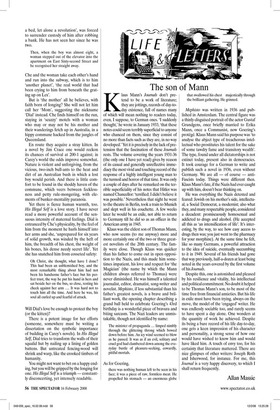The son of Mann
Klaus Mann’s Journals don’t pretend to be a work of literature; they are jottings, records of day-today existence, full of names many of which will mean nothing to readers today, even, I suppose, to German ones. ‘I suddenly thought,’ he wrote in January 1933, ‘that these notes could seem terribly superficial to anyone who chanced on them, since they consist of no more than facts such as they are, in no way developed.’ Yet it is precisely in the lack of pretension that the fascination of these Journals rests. The volume covering the years 1931-36 (the only one I have yet read) gives by reason of its casual and generally unreflective immediacy the most vivid and touching record of the response of a highly intelligent young man to the turmoil and horror of that time. It was only a couple of days after he remarked on the terrible superficiality of his notes that Hitler was named Chancellor: ‘terrified; I didn’t believe it was possible.’ Nevertheless that night he went to the theatre in Berlin, took a train to Munich and slept well in his couchette. A few weeks later he would be an exile, not able to return to Germany till he did so as an officer in the American army in 1945.
Klaus was the eldest son of Thomas Mann, who now seems (to me anyway) more and more certainly one of the two or three greatest novelists of the 20th century. The family were close. Though Klaus was quicker than his father to come out in open opposition to the Nazis, and this made him sometimes impatient, his love and respect for ‘the Magician’ (the name by which the Mann children always referred to Thomas) were never diminished. He was himself a talented journalist, editor, dramatist, song-writer and novelist. Mephisto, if less substantial than his father’s greatest novels, is a brave and brilliant work, the opening chapter describing a grand ball held to celebrate Goering’s 43rd birthday is a wonderful piece of bravura and biting sarcasm. The Nazi leaders are unmistakable, though not identified by name:
The minister of propaganda ... limped nimbly through the glittering throng which bowed down before him. An icy wind seemed to blow as he passed. It was as if an evil, solitary and cruel god had clambered down among the everyday bustle of pleasure-seeking, cowardly, pitiful mortals.
As for Goering,
there was nothing human left to be seen in his face; it was a piece of raw, formless meat. He propelled his stomach — an enormous globe that swallowed his chest majestically through the brilliant gathering. He grinned.
Mephisto was written in 1936 and published in Amsterdam. The central figure was a thinly-disguised portrait of the actor Gustaf Grundgens, once briefly married to Erika Mann, once a Communist, now Goering’s protégé. Klaus Mann said his purpose was ‘to analyse the abject type of treacherous intellectual who prostitutes his talent for the sake of some tawdry fame and transitory wealth’. The type, found under all dictatorships is not extinct today, present also in democracies. It took courage for a German to write and publish such a novel in 1936, even without Germany. We are all — of course — antiFascists today. Things were different then. Klaus Mann’s fate, if the Nazis had ever caught up with him, doesn’t bear thinking on.
He was everything the Nazis detested and feared: Jewish on his mother’s side, intellectual, a Social Democrat, a modernist; also what they, and many respectable people, considered a decadent: promiscuously homosexual and addicted to drugs and alcohol. (He accepted all this as ‘an intensification of life’. It’s interesting, by the way, to see how easy access to drugs then was; you just went to the pharmacy for your morphine). At the same time he felt, like so many Germans, a powerful attraction to the idea of suicide, eventually succumbing to it in 1949. Several of his friends had gone that way previously, half-a-dozen at least being noted in the years covered by the first volume of his Journals.
Despite this, one is astonished and pleased by his resilience and vitality, his intellectual and political commitment. No doubt it helped to be Thomas Mann’s son, to be most of the time free from financial anxieties. But his life in exile must have been trying, always on the move, the model of the ‘engaged’ writer. He was endlessly sociable too, and rarely seems to have spent a day alone. One wonders at the quantity of work he achieved. Despite its being a bare record of his life day-to-day, one gets a keen impression of his character and personality, a strong sense of how one would have wished to know him and would have liked him. A touch of envy too, for his certainty that literature mattered. There are nice glimpses of other writers: Joseph Roth and Isherwood, for instance. For me, this Journal is a very happy discovery, to which I shall return frequently.
Allan Massie


















































































 Previous page
Previous page